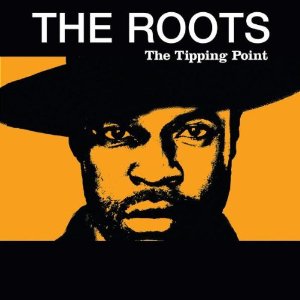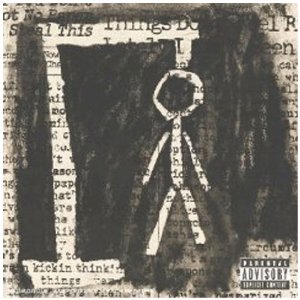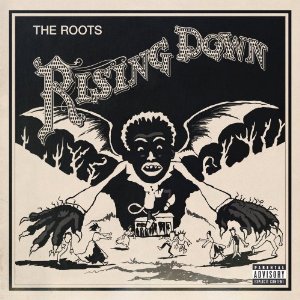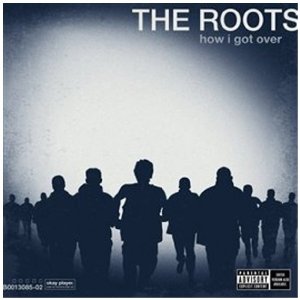In case you missed part one in our breakdown of the Legendary Roots Crew’s discography, never fear. Just click here. Now, let’s move on!
The Tipping Point (2004)
 Drew: Having exhausted almost all avenues of restless experimentation with Phrenology, The Roots stepped back in a major way with The Tipping Point, a record far more interested in bobbing heads than in expanding their genre. Having officially reached the point where I experienced every new Roots release in real time with Phrenology, I recall The Tipping Point vividly, and remember being underwhelmed at the time by an album that sounded like standard-issue hip-hop next to Phrenology. That’s foolhardy, of course, and while it remains by a long shot the most traditional-sounding record of their career’s second half, it’s clear that, divorced from the shadow of their previous album, The Tipping Point, like every Roots release, has tricks to spare: that luscious vinyl crackle that opens the Sly Stone-exhuming “Star” practically telegraphs the commencement of an “instant-vintage” sort of album. The grooves are stately, insistently funky affairs, from the groove-rock of “Star” to the minimalist “I Don’t Care”, from the frenetic “Boom!” to the haunting, reggae-flecked “Guns Are Drawn”, from the dark, gurgling electro of “Don’t Say Nuthin'” to the title-appropriate “Stay Cool”, each beat that hip-hop’s – nay, music’s – greatest band concocts on The Tipping Point is scientifically engineered to elicit whiplash by sheer force of groove. It may be pretty light stuff when stacked up next to most of their 2000s output, but good God, is it ever a crackling good time. Grade: B+
Drew: Having exhausted almost all avenues of restless experimentation with Phrenology, The Roots stepped back in a major way with The Tipping Point, a record far more interested in bobbing heads than in expanding their genre. Having officially reached the point where I experienced every new Roots release in real time with Phrenology, I recall The Tipping Point vividly, and remember being underwhelmed at the time by an album that sounded like standard-issue hip-hop next to Phrenology. That’s foolhardy, of course, and while it remains by a long shot the most traditional-sounding record of their career’s second half, it’s clear that, divorced from the shadow of their previous album, The Tipping Point, like every Roots release, has tricks to spare: that luscious vinyl crackle that opens the Sly Stone-exhuming “Star” practically telegraphs the commencement of an “instant-vintage” sort of album. The grooves are stately, insistently funky affairs, from the groove-rock of “Star” to the minimalist “I Don’t Care”, from the frenetic “Boom!” to the haunting, reggae-flecked “Guns Are Drawn”, from the dark, gurgling electro of “Don’t Say Nuthin'” to the title-appropriate “Stay Cool”, each beat that hip-hop’s – nay, music’s – greatest band concocts on The Tipping Point is scientifically engineered to elicit whiplash by sheer force of groove. It may be pretty light stuff when stacked up next to most of their 2000s output, but good God, is it ever a crackling good time. Grade: B+
Big Money: After testing the boundaries of…seemingly every got-damn thing on Phrenology, the follow-up, The Tipping Point, found Thought and co. at their cleanest and meanest. It’s certainly the most concise album of the band’s career, and also finds itself outfitted with the least guest appearances of any Roots album. So, if you’re waiting for that Black Thought solo joint to drop, you can console yourself with this for the time being. Although the running time and song count on The Tipping Point is shorter than average, the number of classic joints per track is still in line with what you’ve come to expect from these guys. My favorites include the bass-heavy “I Don’t Care,” the return to the fold of former member-turned-supa-produca Scott Storch on “Don’t Say Nuthin’,” and then there’s “Boom!,” on which Thought drops note-perfect impressions of Kool G. Rap and Big Daddy Kane. Can’t forget about their closing cover of George Kranz’s dance smash “Din Daa Daa,” on which Questlove beats his sticks like Joe Jackson beat Tito. Grade: A
Game Theory (2006)
 Drew: If Phrenology is a fascinating, brilliant record precisely because it’s so slapdash and reckless, Game Theory is every bit as vital for its remarkable, tunnel-vision focus and its sharp, zeroed-in sense of purpose. It’s an album in the truest sense of the word, a braid-tight collection of beats and rhymes that sees songs bleeding into each other almost imperceptibly until they take compelling individual shapes. The drum kick and rhyme onslaught that kick off the title track are like a starter’s pistol; these grooves all knock properly, but they’re far more caustic than they ever were onTipping Point, synergizing Public Enemy, Sly Stone, and Funkadelic’s darkest moments into a commanding manifesto of righteous anger and awe-inspiring musicianship. And it’s clearly a personal highwater mark for Black Thought – brimming with indignation about a variety of topics, he’s a microphone monster onTheory, his flawless, locked-in flow reflecting remarkable artistic maturity. Ghostly, gnarly jams like “Baby” and “In the Music” morph into urgent tracks like the smooth “Don’t Feel Right” and the fuzzed-out indie-rock of “Here I Come”; and then, of course, there’s that title track, a fiery screed as lively as it is livid. Game Theory is more than a great Roots record; it’s a distillation of The Roots’ aesthetic into something purposeful and essential, and a testimony to the possibilities of great hip-hop.Grade: A
Drew: If Phrenology is a fascinating, brilliant record precisely because it’s so slapdash and reckless, Game Theory is every bit as vital for its remarkable, tunnel-vision focus and its sharp, zeroed-in sense of purpose. It’s an album in the truest sense of the word, a braid-tight collection of beats and rhymes that sees songs bleeding into each other almost imperceptibly until they take compelling individual shapes. The drum kick and rhyme onslaught that kick off the title track are like a starter’s pistol; these grooves all knock properly, but they’re far more caustic than they ever were onTipping Point, synergizing Public Enemy, Sly Stone, and Funkadelic’s darkest moments into a commanding manifesto of righteous anger and awe-inspiring musicianship. And it’s clearly a personal highwater mark for Black Thought – brimming with indignation about a variety of topics, he’s a microphone monster onTheory, his flawless, locked-in flow reflecting remarkable artistic maturity. Ghostly, gnarly jams like “Baby” and “In the Music” morph into urgent tracks like the smooth “Don’t Feel Right” and the fuzzed-out indie-rock of “Here I Come”; and then, of course, there’s that title track, a fiery screed as lively as it is livid. Game Theory is more than a great Roots record; it’s a distillation of The Roots’ aesthetic into something purposeful and essential, and a testimony to the possibilities of great hip-hop.Grade: A
Big Money: I’m not sure whether The Tipping Point was an attempt at sort of a “sellout” that failed commercially (Phrenology sold about 300,000 copies more,) but it does feel like it may have been kind of an experiment (maybe to satisfy the bosses at new label home Geffen). Game Theory finds The Roots back in serious mode – actually, by this point, they’re fucking pissed. Game Theory was the most consistently sober and morose album the band had released to that date. That’s not to say it’s not dope, though. By this point, Black Thought had evolved into a Class A lyricist with lyrics that gave the sober arrangements of his songs even extra weight. Although the album takes a turn for the worse towards the end (“Atonement” and “Clock With No Hands” are two of the most inessential Roots jawns ever), the closing track “Can’t Stop This,” performed in tribute to legendary producer J. Dilla, more than makes up for it. Actually, given the prominent sample of The Jackson 5’s “All I Do Is Think Of You” in the song, it can now serve as a remembrance for both Dilla and the late King of Pop. Grade: A-
Rising Down (2008)
 Drew: Rising Down is an interesting beast: it was released to little fanfare, came in the wake of the relatively poor-selling Game Theory, and features a guest rapper on almost every track. Roots proteges Dice Raw, Truck North, and Porn (I would suggest Googling him, but I can personally promise you that won’t work) are in the mix here, as well as conscious rap compatriots like Talib Kweli, Common, and Mos Def, and relative upstarts like Saigon and Wale. It opens with a recording of an angry screaming match between The Roots and their former label heads at Geffen, and never really eases up from there – fraught with nervous energy and oozing social unease from every pore, Rising Down is a definitive “yes” in the face of anyone who would wonder if they could get any darker than Game Theory. It starts with that unnerving Jim Crow-era image on the cover, continues with that acidic, uncomfortable phone call, and is sewn up with the actual music, a stark, textured cycle through gloom and despondence. If Game Theory‘s choruses were ghostly, Rising Down‘s are practically howls from the grave; but more importantly, as Fleetwood Mac proved so many years ago, turmoil spurns passion, which can be spun into arresting art. Black Thought’s hot streak continues here – scarcely contributing a verse a song, Thought makes every word count, and delivers each line for optimum impact – and everyone else is on their A-game too, each hard snare vibrating the nerves, each guest rhyme more searing than the last. By the time the tide literally turns at the album’s ass end with the comparatively-sprightly “Rising Up” (with perhaps the finest percussion ever laid down on a Roots track and Chrisette Michelle’s lovely hook), the damage has been done – Rising Down is restless, moodly and eviscerating. Oppressive, yes, but also incredibly compelling. Grade: A-
Drew: Rising Down is an interesting beast: it was released to little fanfare, came in the wake of the relatively poor-selling Game Theory, and features a guest rapper on almost every track. Roots proteges Dice Raw, Truck North, and Porn (I would suggest Googling him, but I can personally promise you that won’t work) are in the mix here, as well as conscious rap compatriots like Talib Kweli, Common, and Mos Def, and relative upstarts like Saigon and Wale. It opens with a recording of an angry screaming match between The Roots and their former label heads at Geffen, and never really eases up from there – fraught with nervous energy and oozing social unease from every pore, Rising Down is a definitive “yes” in the face of anyone who would wonder if they could get any darker than Game Theory. It starts with that unnerving Jim Crow-era image on the cover, continues with that acidic, uncomfortable phone call, and is sewn up with the actual music, a stark, textured cycle through gloom and despondence. If Game Theory‘s choruses were ghostly, Rising Down‘s are practically howls from the grave; but more importantly, as Fleetwood Mac proved so many years ago, turmoil spurns passion, which can be spun into arresting art. Black Thought’s hot streak continues here – scarcely contributing a verse a song, Thought makes every word count, and delivers each line for optimum impact – and everyone else is on their A-game too, each hard snare vibrating the nerves, each guest rhyme more searing than the last. By the time the tide literally turns at the album’s ass end with the comparatively-sprightly “Rising Up” (with perhaps the finest percussion ever laid down on a Roots track and Chrisette Michelle’s lovely hook), the damage has been done – Rising Down is restless, moodly and eviscerating. Oppressive, yes, but also incredibly compelling. Grade: A-
Big Money: For some reason, it took me a long, long time to fully appreciate Rising Down. Thematically, it continues in the vein of Game Theory: even when it’s not political, it’s passionate. There’s not a light moment until the final track (the somewhat out-of-place “Rising Up,” which sounds like The Roots trying REALLY HARD to be sunny). It contains more (rapping) guest appearances than any Roots album since Illadelph Halflife, with the usual truckload of associates showing up (including the previously M.I.A. Malik B.) as well as the likes of Mos Def, Talib Kweli (separately), and a young Wale. Black Thought gets lost in the sauce a little bit, and aside from the scintillating “Get Busy,” the most memorable voice might be Kweli’s on “I Will Not Apologize.” Plus, there was the whole “Birthday Girl” saga, and as much as I like Patrick Stump, putting him on a Roots album would’ve been like putting George Michael on a Public Enemy album. Thank goodness someone had the sense to leave that song off of the final product. Ultimately, Rising Down feels like a sequel of sorts to Game Theory, and you know what they say about sequels as compared to the originals… Grade: B
How I Got Over (2010)
 Drew: It should be noted, of course, that a lesser Roots album is never anything less than utterly mesmerizing; as a matter of fact, all these albums have been graded on what I call the Relative Roots Scale, an algorithm that states that The Roots are so terrific that a Roots ‘B’ equivocates to an album that would be an ‘A’ for anyone else, and that a Roots ‘A’ is, in actuality, an “Apithery”, which is a letter grade higher than ‘A’ that is so rare there’s not even a keyboard symbol for it yet. By this equation, How I Got Over is actually a pretty stellar album; for The Roots, it’s mere excellence, the kind of brilliance that this band keeps in small deposits in off-shore accounts just in case they’re a bit weary of reinventing their genre time and again. That said, How I Got Over is a bit more of a mood record than their previous few, and without a sharp ear it can sound a little samey; the prevailing feeling isn’t quite as despondent as Game Theory or Rising Down, but it’s certainly downbeat and contemplative. That it lacks the fire of earlier Roots albums isn’t necessarily a bad thing – it’s unreasonable to expect every Roots album to be a 50-minute gut-punch – but it’s an extremely nuanced, textured release, the subtleties of the arrangements rewarded by multiple listens. “Walk Alone” is a highlight, the kind of dissonant, spooky track the previous two records contained in spades, and though the rest of the album is accomplished and compulsively listenable, it’s comparatively complacent. Grade: B
Drew: It should be noted, of course, that a lesser Roots album is never anything less than utterly mesmerizing; as a matter of fact, all these albums have been graded on what I call the Relative Roots Scale, an algorithm that states that The Roots are so terrific that a Roots ‘B’ equivocates to an album that would be an ‘A’ for anyone else, and that a Roots ‘A’ is, in actuality, an “Apithery”, which is a letter grade higher than ‘A’ that is so rare there’s not even a keyboard symbol for it yet. By this equation, How I Got Over is actually a pretty stellar album; for The Roots, it’s mere excellence, the kind of brilliance that this band keeps in small deposits in off-shore accounts just in case they’re a bit weary of reinventing their genre time and again. That said, How I Got Over is a bit more of a mood record than their previous few, and without a sharp ear it can sound a little samey; the prevailing feeling isn’t quite as despondent as Game Theory or Rising Down, but it’s certainly downbeat and contemplative. That it lacks the fire of earlier Roots albums isn’t necessarily a bad thing – it’s unreasonable to expect every Roots album to be a 50-minute gut-punch – but it’s an extremely nuanced, textured release, the subtleties of the arrangements rewarded by multiple listens. “Walk Alone” is a highlight, the kind of dissonant, spooky track the previous two records contained in spades, and though the rest of the album is accomplished and compulsively listenable, it’s comparatively complacent. Grade: B
Big Money: I, sir, disagree. How I Got Over is a return to form for a group that had wasn’t that far off of their typical form to begin with: which is to say, it’s excellent. As you may have ascertained at this point, I tend to dig Roots albums that are a little more Black Thought-heavy, and it seems as though the guests are a little dialed down here, leaving the true star of the show ample space to shine. Thought seems even more contemplative than usual, with verses so deep I’m still picking them apart a year and a half later. This was also the album where The Roots started to become equal parts hip-hop and indie rock, with guest appearances from Joanna Newsom and My Morning Jacket’s Jim James. His plaintive crooning on the single “Dear God 2.0” makes that song one of the most otherworldly pieces of music released in2010. Grade: A
Drew very capably reviewed The Roots’ latest, Undun, here. I’m gonna have to give that one an incomplete, as it hasn’t totally sunk in yet. More accurately, I’m trying to determine the point when it becomes an album I love as much as How I Got Over, Phrenology or The Tipping Point because, as much as I enjoy certain parts of the album, I’m not 100% sold on Undun as classic material yet.
Some might also say that this isn’t a complete overview of The Roots’ discography. After all, there’s the live album, the two “greatest hits” packages (which are worth your time, if not for the many alternate versions/live tracks/remixes/outtakes, then for Questlove’s ridiculously detailed liner notes), and last year’s John Legend collabo Wake Up, which I go back and forth on simply liking vs. really liking. Oh, they also collaborated with legendary soul diva Betty Wright on this year’s Betty Wright: The Movie, which Drew also reviewed: you can find it here.
